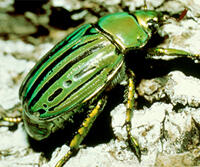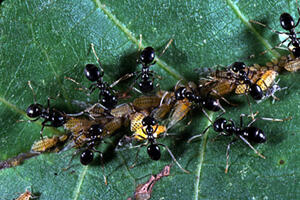Dear Shelly,
Your question can be answered in two ways. We can consider numbers of species. Or, we can consider numbers of individual organisms.

Which animal group makes up the largest percentage of the world's organisms?
— Shelly P., Grade 9
Entomologist Toby Schuh answers this question:
Dear Shelly,
Your question can be answered in two ways. We can consider numbers of species. Or, we can consider numbers of individual organisms.
In terms of numbers of species, insects certainly represent the largest percentage of the world's organisms. There are more than 1 million species of insects that have been documented and studied by scientists. And the total number of documented species of living organisms at the present time is probably about 2.5 million. So insects represent about 40% of all known living species!
But that's not the end of the story. Scientists estimate that there may actually be somewhere between 10 and 30 million species of insects inhabiting our planet. So insects as a percentage of organisms might actually be greater than we currently estimate.

Insect species represent the largest percentage of the world's known species. Beetles make up about one-third of all known insect species.
If we look at your question from the point of view of numbers of individuals, the answers is almost certainly insects as well. In fact, the answer may be ants . There are 14,000 known species of ants. And they all form ant colonies. In some species of ants, those colonies may be extremely large. One colony may contain many tens of thousands of individuals! Some scientists have made credible calculations suggesting that the weight of all ants is greater than that of all humans.

Ants may represent the largest number of individual organisms on our planet. They live in all but the most extreme environments.
Explore More:

Name:
Toby Schuh
Job Title:
Curator, Division of
Invertebrate
Zoology
Known For:
Toby is an entomologist. He studies insects from around the world.
Cool Fact:
Toby is in charge of the Planetary Biodiversity Inventory project. Its goal is to investigate the
biodiversity
of bugs, collect and describe new species, and learn about their host plants. This data will help scientists like Toby understand the evolutionary relationships among bug species.